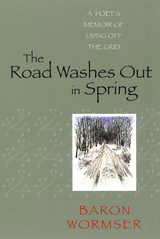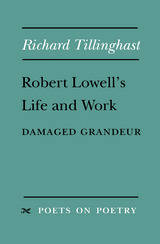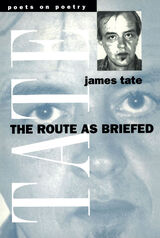149 books about Poets, American and 4
start with R
149 books about Poets, American and 4
149 books about Poets, American
4 start with R start with R
4 start with R start with R

The Road Washes Out in Spring
A Poet’s Memoir of Living Off the Grid
Baron Wormser
University Press of New England, 2008
For nearly twenty-five years, poet Baron Wormser and his family lived in a house in Maine with no electricity or running water. They grew much of their own food, carried water by hand, and read by the light of kerosene lamps. They considered themselves part of the “back to the land” movement, but their choice to live off the grid was neither statement nor protest: they simply had built their house too far from the road and could not afford to bring in power lines. Over the years, they settled in to a life that centered on what Thoreau called “the essential facts.” In this graceful meditation, Wormser similarly spurns ideology in favor of observation, exploration, and reflection. “When we look for one thread of motive,” he writes, “we are, in all likelihood, deceiving ourselves.” His refusal to be satisfied with the obvious explanation, the single thread of motive, makes him a keen and sympathetic observer of his neighbors and community, a perceptive reader of poetry and literature, and an honest and unselfconscious analyst of his own responses to the natural world. The result is a series of candid personal essays on community and isolation, nature, civilization, and poetry.
[more]

Robert Lowell in Love
Jeffrey Meyers
University of Massachusetts Press, 2015
Robert Lowell was known not only as a great poet but also as a writer whose devotion to his art came at a tremendous personal cost. In this book, his third on Robert Lowell, Jeffrey Meyers examines the poet's impassioned, troubled relationships with the key women in his life: his mother, Charlotte Winslow Lowell; his three wives—Jean Stafford, Elizabeth Hardwick, and Caroline Blackwood; nine of his many lovers; his close women friends—Mary McCarthy, Elizabeth Bishop, and Adrienne Rich; and his most talented students, Anne Sexton and Sylvia Plath.
Lowell's charismatic personality, compelling poetry, and literary fame attracted lovers and friends who were both frightened and excited by his aura of brilliance and danger. He loved the idea of falling in love, and in his recurring manic episodes he needed women at the center of his emotional and artistic life. Each affair became an intense dramatic episode. Though he idealized his loves and encouraged their talents, his frenetic affairs and tortured marriages were always conducted on his own terms. Robert Lowell in Love tells the story of the poet in the grip of love and gives voice to the women who loved him, inspired his poetry, and suffered along with him.
Lowell's charismatic personality, compelling poetry, and literary fame attracted lovers and friends who were both frightened and excited by his aura of brilliance and danger. He loved the idea of falling in love, and in his recurring manic episodes he needed women at the center of his emotional and artistic life. Each affair became an intense dramatic episode. Though he idealized his loves and encouraged their talents, his frenetic affairs and tortured marriages were always conducted on his own terms. Robert Lowell in Love tells the story of the poet in the grip of love and gives voice to the women who loved him, inspired his poetry, and suffered along with him.
[more]

Robert Lowell's Life and Work
Damaged Grandeur
Richard Tillinghast, Editor
University of Michigan Press, 1995
Robert Lowell was regarded by many as the greatest American poet of his generation. "Somehow or other...in the middle of our worst century so far," his contemporary and friend Elizabeth Bishop wrote, "we have produced a magnificent poet." The scion of a distinguished New England family, Lowell crafted his poetry to comment on the nation's fate and even to influence the course of American politics. Along with Anne Sexton, John Berryman, and Sylvia Plath, he was a pioneer in the movement later known as Confessional Poetry, and his political gestures were often timely and controversial: his refusal of President Johnson's invitation to the White House came to symbolize the opposition of writers and intellectuals to the Vietnam War. Since Lowell's death in 1977, his reputation has suffered a decline; yet arguably no poet living today writes with the same authority, the same sense of grandeur.
Robert Lowell's Life and Work: Damaged Grandeur is a critical memoir by acclaimed poet Richard Tillinghast, a friend and student of Lowell's in the 1960s. Tillinghast shows how Lowell's gift for the grand gesture was tragically intertwined with the manic-depressive illness that afflicted him throughout his adult life- hence the "damaged grandeur" of the title. This book offers a radical re- examination of Lowell's poetic career and argues for the restoration of this complex and troubled poet to a pre-eminent position in American letters.
Richard Tillinghast's books of poetry include Our Flag was Still There, Sewanee in Ruins, The Knife and Other Poems, and Sleep Watch. He writes regularly for The New York Times, Atlantic Monthly, and The New Republic. He is Professor Emeritus of English, University of Michigan, and is the recipient of a fellowship from the John Simon Guggenheim Foundation.
[more]

The Route as Briefed
James Tate
University of Michigan Press, 1999
The Route as Briefed collects prose by Pulitzer Prize winning poet James Tate. It is an amazingly eclectic collection, offering essays, interviews, short-short stories, memoirs, and even a recipe for squirrel brains in black butter. The essays and interviews touch on themes ranging from poetic influences to MFA programs, and from the role of humor in poetry to the nature of regional writing. The fiction selections--none more than four pages long--are as engaging as their titles, e.g., Despair Ice Cream, Running for Your Life, Dreams of a Robot Dancing Bee, Pie, and A Cloud of Dust. The memoirs include Tate's journal entries during a trip to Spain, and a long piece on the father he never met, killed in action during World War II.
In typical Tate style, the book continually straddles the line between fiction and autobiography, entertaining readers with amusing accounts of the poet's own experiences while drawing on these to narrate the fictional stories as well.
James Tate is Professor of Poetry, University of Massachusetts. He is the author of a number of books of poetry, including Worshipful Company of Fletchers: Poems, 1994; Selected Poems, 1991; Distance from Loved Ones, 1990. He has received several awards for his work, including the Pulitzer Prize for poetry in 1992.
In typical Tate style, the book continually straddles the line between fiction and autobiography, entertaining readers with amusing accounts of the poet's own experiences while drawing on these to narrate the fictional stories as well.
James Tate is Professor of Poetry, University of Massachusetts. He is the author of a number of books of poetry, including Worshipful Company of Fletchers: Poems, 1994; Selected Poems, 1991; Distance from Loved Ones, 1990. He has received several awards for his work, including the Pulitzer Prize for poetry in 1992.
[more]
READERS
Browse our collection.
PUBLISHERS
See BiblioVault's publisher services.
STUDENT SERVICES
Files for college accessibility offices.
UChicago Accessibility Resources
home | accessibility | search | about | contact us
BiblioVault ® 2001 - 2024
The University of Chicago Press









